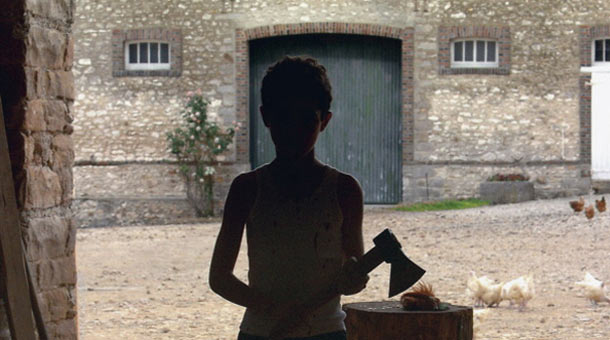
The pacing in the film is excellent and it will keep you guessing long after the credits roll.

The pacing in the film is excellent and it will keep you guessing long after the credits roll.
The English title of the film is “Hidden” which accurately describes the film as a whole; there is a hidden camera that uncovers events in the main character’s past that are hidden from his wife. Michael Haneke’s Caché earned the Best Director award at the 2005 Cannes Film Festival as well as a nomination for the Palme d’Or and a nomination for an Oscar for Best Foreign Film. The pacing in the film is excellent and it will keep you guessing long after the credits roll.
The film begins with Georges Laurent (Daniel Auteuil) and Anne Laurent (Juliette Binoche) watching a video tape that someone left for them which contains what seems like pointless hours of video surveillance of their home. They are baffled at why anyone would be tapping them and why they would want them to know about it. Their first assumption is that it is a prank from their son Pierrot (Lester Makedonsky) and some of his friends. What an eerie feeling it must be to know that someone is watching you for no apparent reason.
They doubt their son or his friends had anything to do with it when another tape shows up. This time the footage is of the outside of their house at night. The only other clue they have to work with is that this second video came with a childish drawing of a person with blood coming from its mouth. Because there is no direct threat, the police cannot do much about it at this point. They are one their own to investigate.

We come to find out that Georges is a television host as they begin to wonder if it was perhaps from a fan turned stalker of his. But he receives a hunch to who might be making these videos after finding a clue in the next video. This time the video is of a person driving around in a car. Georges and Anne were able to spot a street name in that video, which ends up being close to where someone of his past lives.
He visits this person only for him to claim not to know anything about the video tapes. However, it does appear there was some heated history between these two. The strangest part is Georges lies to his wife when he denies the two meet up.
But the lie is short lived because the next video tape they receive is of that very meet up between Georges and the other man whose name is Majid (Maurice Benichou). It turns out that Majid was his adopted brother of Georges. But because he never got along with Majid, they only lived together for six months.
Anne watches that tape and of course is confused as to why Georges lied about talking to Majid. This results in a big argument between the two. You start to wonder if that is the intention of the tapes, to cause a rift between the husband and wife.
I believe Caché is about owning up to mistakes you have made in the past. Hidden guilt that you may have that you wish not to talk about. In this case, the tapes served to uncover the truths that were covered up. The film makes a relevant reference to a piece of French history when France police shot down Algerian immigrants protesting a government curfew on October 17th, 1961. As an attempt to cover up the truth, it was reported at the time that only two protesters were killed but we know today that about 400 were murdered.
My absolute favorite part of the film is the way it was shot. Haneke used shots that were mostly comprised of stationary cameras to imply hidden video surveillance. But he mixes them into other parts of the film to suggest that Caché itself could be a tape.
Many people will have problems with the ending of Caché because of the failure to solve the case. But the film’s ending was deliberately left open to the viewer to make their own conclusion. Sharing a common theme to other elements in the film, the mystery behind it remains hidden. The cryptic final scene is perfect because it raises more questions than it answers about two characters that may have had something to hide.